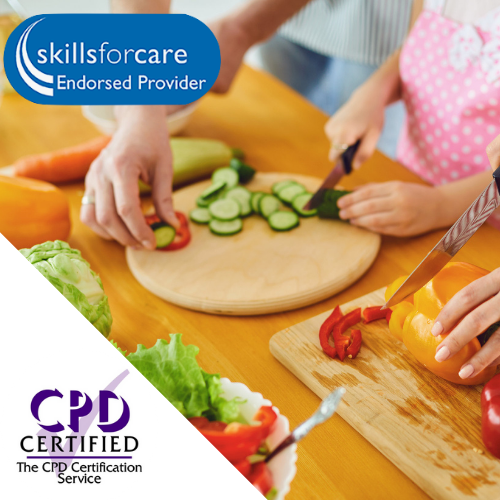In this Nutritionist Career Guide
What Does A Nutritionist Do?
A nutritionist is someone who possesses food science knowledge. They use what they have learnt and their skills and expertise to advise individuals and groups about nutrition, diets and healthy lifestyles and help them to meet their goals. There are many specialist areas, e.g. sports and exercise, public health, food science, animal nutrition, etc. Therefore, what a nutritionist does will depend on their role and specialisms.
Often, nutritionists can be mistaken for dietitians and nutritional therapists. However, they are different roles, i.e. dietitians are regulated health professionals with legally protected titles. The British Dietetic Association (BDA) has further information about the differences between the three jobs on its website.
A nutritionist’s main aim is to promote healthy diets and lifestyles, prevent illnesses and diseases and help people to make the correct choices to improve their health and well-being. If individuals (and communities) are healthy and happy, it should lower the risk of ill health and diseases and reduce the burden on taxpayers who help fund the NHS.
Nutritionists will carry out many tasks, including conducting research, tests, surveys and trials, analysing tests and samples, delivering workshops, presentations, campaigns and initiatives, providing evidence-based nutritional advice, etc. The role may also involve some administrative work, e.g. completing reports, creating presentations and publishing papers.
A nutritionist will work with many colleagues (including agency staff) of different levels. They can also liaise with various external stakeholders, such as the public (customers), patients, doctors, nurses, dietitians, pharmacists, GPs, other healthcare professionals, local authorities, schools, voluntary organisations, businesses, etc.
Nutritionists can work in various sectors and settings. They can work for different-sized companies, from small food producers and charities to large organisations with hundreds of employees, e.g. universities, public bodies and supermarket chains. They can also be self-employed, do freelance work or work for recruitment agencies on a temporary or contract basis.

Responsibilities
A nutritionist’s responsibilities will depend on their role and specialisms.
Some examples of common duties can include (this list is not exhaustive):
- Shaping nutritional advice and guidelines and advocating change by developing policy.
- Undertaking research, practical tests, reviews, surveys and projects.
- Searching for volunteers and recruiting them to participate in trials.
- Processing and analysing biological samples.
- Providing scientific evidence-based advice on healthy eating and nutrition, including specialist advice to specific groups, i.e. the elderly.
- Planning, creating, organising and delivering various campaigns and initiatives.
- Developing, monitoring and evaluating menus and meal plans, e.g. for individuals, workplaces, businesses (e.g. restaurants) and institutions, such as schools and residential care homes.
- Delivering workshops and presentations on nutrition, diets, healthy lifestyles and well-being to individuals and groups.
- Training and educating health professionals about diet and nutrition.
- Writing for paper publications and online to promote healthy eating and nutritional advice.
- Working with hospital patients under the supervision of healthcare professionals, such as doctors, nurses and dietitians.
Working Hours
A nutritionist can expect to work 37–40 hours a week, usually Monday–Friday. However, they can do more or fewer hours depending on where they work and employment type, e.g. employed or self-employed. There may be flexible working opportunities, e.g. part-time, job share, remote working or working from home.
Being a nutritionist is not always a 9–5 job. They may have to work unsociable hours, such as evenings, weekends and bank holidays, especially if self-employed or freelance. The role may involve local or national travel if a nutritionist works in the community or at different healthcare settings, which can lengthen their working day. Overseas work is uncommon but may be possible for some.

What to Expect
Being a nutritionist can be rewarding, especially if an individual loves to help people. They have an important role in promoting healthy eating and lifestyles and preventing diseases and illnesses in individuals and communities. They can go home at the end of the day knowing they are helping to make a difference in people’s lives, especially if the people or groups they work with are achieving their goals and improving their health.
Nutritionists will meet people with different backgrounds, cultures, lifestyles and issues, e.g. weight management problems. They will also carry out many day-to-day tasks, and there are plenty of opportunities to specialise. Therefore, nutritionists are unlikely to get bored in their role, as their work can be varied, and they get to work closely with people.
Individuals do not need a degree to become a nutritionist unless they want to be registered. Therefore, it can be a good career option for those who may struggle to pay for expensive university courses or do not want student loan debts hanging over their heads. We will look at the different qualification routes later.
Nutritionist jobs are available across the UK, and there may be opportunities for overseas work with some roles. The salary is competitive, and there is the potential to earn significantly with additional qualifications and experience.
Being a self-employed or freelance nutritionist can give individuals independence and flexibility. Being your own boss can be attractive, as it allows individuals to take charge of their working day and overall career progression. It can also help them achieve a decent work-life balance.
Even though there are positives to being a nutritionist, there are challenges and cons, e.g.:
- Difficult customers/clients – nutritionists can often come across headstrong, challenging individuals who are reluctant to make changes and have no interest as they have been referred. Close contact with people is not always a pleasure and can be stressful. Prospective nutritionists should keep this in mind.
- Unprotected title – unlike the term dietitian, which is a protected title in the UK, nutritionist is not. There are also no specific qualifications or experience required to become a nutritionist. Therefore, it can be confused with other jobs. Having no protected title or specific qualifications leaves the role vulnerable to ‘rogue’ individuals who offer nutritional advice without the necessary training and competence.
- Physical and mental demands – the role can sometimes be mentally demanding, as workloads can be high, deadlines can be tight and there can be different demands to juggle. It can also be physically demanding if nutritionists work in the community and travel or are on their feet for most of the working day.
Every career choice has pros and cons, and individuals must know what to expect before deciding whether it is a suitable career. Nutritionists can face challenging customers, and there are mental/physical demands. Their titles are also unprotected, and their role may be confused with others. However, there are many positives too. Individuals who become nutritionists are passionate about healthy eating, fitness and nutrition and love helping people with their health and well-being.
When considering whether to be a nutritionist, individuals should look at the pros and cons. They should also ensure they have the right personal qualities to carry out the role and responsibilities required.
Personal Qualities Needed To Be A Nutritionist
Some of the personal qualities a nutritionist requires will include (this list is not exhaustive):
- The ability to use IT and software packages.
- An interest and knowledge in science (especially biology), food, nutrition and health.
- Knowledge of education and training.
- Non-judgemental, positive, empathetic, caring, tactful, helpful and friendly.
- Sensitivity and understanding.
- Confident, assertive, determined, enthusiastic, focused and motivated.
- Excellent communication skills, both written and verbal.
- Interpersonal skills.
- Researching and analysing skills.
- Thinking and reasoning skills.
- Presentation skills.
- Customer service skills.
- Negotiating skills.
- Organisational and time management skills.
- Business management skills (self-employed and freelance nutritionists).
- Being thorough, accurate and having attention to detail.
- The ability to work well with others in a team and alone using their own initiative.
- The ability to work under pressure, be patient and remain calm in stressful situations.
- The ability to cope with multiple demands.
- The ability to accept criticism.
- The ability to explain complicated information to clients simply, clearly and concisely.
- The ability to motivate others to encourage them to make changes.
- The ability to understand others and their lifestyles.
- The ability to develop relationships with people from different backgrounds, cultures and lifestyles.
Qualifications
There are many different routes to becoming a nutritionist. Individuals could go to university, enrol on a training course or apply for an apprenticeship (in the future). They could also do work experience to help them enter the role.
University
An individual does not need a degree to become a nutritionist. However, having an undergraduate or postgraduate degree can help individuals stand out from the crowd. It is also a requirement if individuals want to become Registered Nutritionists.
Some examples of relevant courses are (this list is not exhaustive):
Undergraduate degrees
- BSc (Hons) Food, Nutrition and Health.
- BSc (Hons) Fitness, Nutrition and Health.
- BSc (Hons) Human Nutrition.
- BSc (Hons) Nutrition.
- BSc (Hons) Public Health Nutrition.
- BSc (Hons) Nutrition (Exercise & Health).
- BSc (Hons) Nutritional Sciences.
- BSc (Hons) Sport & Exercise Nutrition.
- BSc (Hons) Animal Science (pathway specialising in animal nutrition).
Postgraduate degrees
- MSc Nutrition and Behaviour.
- MNutr (Hons) Nutrition.
- MSc Clinical Nutrition & Health.
- MSc Public Health Nutrition.
- MSc Nutrition for Sports and Exercise.
It is better if courses are accredited, e.g. by the Association for Nutrition (AfN). A list of courses is available on their website.
The entry requirements will depend on each university, and individuals should check before applying. They will typically need three good A Levels (including biology or chemistry) for an undergraduate degree or a certain number of UCAS points to get into university. Postgraduate degrees usually require a 2:1 or 2:2 in a relevant undergraduate degree. Some institutions also invite applicants for an interview as part of the selection process.
Training courses
Undertaking a training course can help individuals get into the role. Some courses have been certified by the Association for Nutrition (AfN), which provides an introduction and insight into nutrition to help individuals decide whether it is a suitable career. There is a list of AfN Certified Courses on their website. The entry requirements and completion time will depend on the course type and study mode, e.g. e-learning, classroom or blended learning.
Individuals are not guaranteed success with courses and qualifications. However, it will demonstrate to employers that they are keen on the job and may give individuals a competitive edge.
Apprenticeships
A Level 7 nutritionist apprenticeship (equivalent to a Master’s degree) is currently in development, but it is unknown when it will be available. Individuals should check for updates, which can be found on the Institute for Apprenticeships and Technical Education’s website.

Work Experience
Undertaking relevant work experience (paid or voluntary) can help individuals become nutritionists, as it can be competitive. Some degrees can include work placements, which can help individuals gain practical experience.
Before applying for a nutrition course, individuals could also gain experience working or volunteering for the NHS.
Having relevant experience in nutrition (human or animal) can be beneficial.
Individuals could apply for paid or volunteer roles in the following sectors (this list is not exhaustive):
- Food manufacturing, i.e. product development and food technology.
- Sports and fitness.
- Food safety.
- Charitable, e.g. food banks and welfare.
- Laboratories and research.
- Health and well-being retailers.
- Residential care homes.
There is information on volunteering and local opportunities on Do-IT, NCVO, Volunteering Matters and Indeed.

Training Courses
Learning does not stop with experience or once someone becomes qualified. Attending relevant training courses and having additional certifications can help individuals enter the profession, enhance their employability and give them a competitive edge. Many accredited private training companies can provide relevant training courses. We offer numerous food-related courses, including one on nutrition and healthy eating.
In addition to the nutrition qualifications, some examples of other courses that may be useful for nutritionists include (this list is not exhaustive):
- Data protection and the GDPR.
- Customer service skills.
- Time management.
- Risk assessment.
- COVID-19 awareness.
- Diabetes awareness.
- ADHD awareness.
- Disability awareness.
- Cardiovascular disease awareness.
- Equality and diversity.
- Safeguarding (children and vulnerable adults).
Professional bodies, charities and associations, such as the Association for Nutrition, the Nutrition Society, the British Nutrition Foundation, Nutrition Graduates and the British Association for Nutrition and Lifestyle Medicine, can also advise on reputable training courses. Some also provide memberships, events and support to help individuals become nutritionists and give those already in the profession the means to continue their professional development.
The type of training required will depend on who an individual works for and their specialisms. It is worth looking at several job advertisements to identify the training needed for roles. Jobs can be found on websites such as GOV.UK find a job service, Indeed, LinkedIn, Glassdoor, NHS Jobs, NHSScotland Jobs, the Nutrition Society, UK Sport Jobs, Nutrition Graduates and others. Also, look at recruitment agencies for nutritionist roles.
More relevant training and competence (skills, experience and knowledge) will open up more opportunities. Refresher training is also advisable as it is a legal requirement and keeps an individual’s knowledge and skills up to date.
Criminal records checks
Nutritionists usually undergo a criminal record check, as they may work around children and vulnerable adults. A criminal record, caution, warning or conviction may put off prospective employers or affect registration. However, they should account for the seriousness of the crime, when it occurred and its relevance to the role.
The organisation that holds criminal records will depend on the country within the UK, for example:
- England and Wales – Disclosure and Barring Service (DBS).
- Northern Ireland – AccessNI.
- Scotland – Protecting Vulnerable Groups (PVG) scheme.
Being self-employed
There are additional responsibilities associated with being self-employed. Self-employed nutritionists must:
- Have the correct insurance, i.e. public liability, professional indemnity, home, car or business. If employing anyone, employer’s liability insurance will be required.
- Register with HMRC.
- File tax returns.
- Register with the ICO to hold personal data (to comply with the Data Protection Act 2018 and the GDPR).
Further advice and guidance on being self-employed can be found on GOV.UK.
If an individual decides to be a self-employed nutritionist, they will need to factor in certain costs, such as:
- Vehicle and running costs, e.g. fuel, maintenance, tax and insurance.
- Working from home costs, e.g. utilities.
- Training.
- Registration.
- Computer and mobile phone.
- Marketing and advertising.
- Insurances.
They should also research and decide on the area, market, competition and services to offer customers. Becoming a member of an association can also help gain more business.
Driving
Most nutritionists will need a full driving licence (preferably with no points), especially if they work in the community. Some roles will provide a company vehicle, but others may require individuals to use their own, which must have business insurance.
Registration
Nutritionists do not need to be registered, but it is advisable. Most employers will look for registered individuals. It is also likely to boost business if self-employed.
The AfN holds a UK Voluntary Register of Nutritionists (UKVRN).. To be added to the register, individuals must have a minimum of a degree in nutrition science. They must also comply with the AfN Standards of Ethics, Conduct and Performance.
There is an initial cost to register and also an annual fee. Registered nutritionists must also undertake CPD (as per the requirements of the AfN Standards) to remain registered.

Where Do Nutritionists Work?
Nutritionists can work for many employers, including private companies, public bodies, charities, not-for-profit organisations, etc.
Some examples include (this list is not exhaustive):
- The National Health Service (NHS).
- Private healthcare companies, e.g. Bupa and Nuffield.
- Health service trusts.
- Primary care organisations.
- The UK Government and their departments.
- International governments.
- Local authorities.
- Education providers.
- The food industry, e.g. manufacturers and retailers.
- Animal feed manufacturers and retailers.
- Vets.
- The sports and exercise sector, e.g. sporting clubs and associations.
- The media, e.g. broadcasters and publications.
- International aid organisations.
They can also be self-employed, freelance or work for recruitment agencies.
Nutritionists can work in various settings, such as (this list is not exhaustive):
- Hospitals.
- GP practices.
- Health centres.
- Pharmacies.
- In the community.
- Laboratories.
- Residential care homes.
- Nursing homes.
- Universities, colleges and schools.
- Restaurants and cafes.
- Health and fitness centres.
- Farms and mills (animal nutrition).
- Veterinary practices.
- At home (if self-employed or hybrid work).
The role may require local or national travel and overnight stays. There may be options to do work overseas.

How Much Do Nutritionists Earn?
What a nutritionist earns will depend on their role, specialisms, location, qualifications, experience, sector and whether they are employed, self-employed, freelance or an agency worker.
According to Indeed UK:
- Starting salaries for nutritionists in the public sector are around £15,000 to £25,000 per year.
- Nutritionists in the private sector earn around £20,000 to £25,000 per year.
- With experience, nutritionists can earn from £30,000 to £55,000 per year.
- At the top end (i.e. senior roles, such as chairs of public health organisations), nutritionists can earn £45,000 to £80,000 per year.
If a nutritionist decides to work for the NHS, their salary is subject to a band pay system (agenda for change pay rates).
For example (these are a guide only and are subject to change):
- Starting salary (band 5) – £27,055–£32,934 per year.
- More experienced (band 6) – £33,706–£40,588 per year.
The NHS also provides generous benefits, e.g. pension scheme, sickness and maternity.
The salaries for self-employed nutritionists will be variable, as they will set their own fees. They will need to factor in various expenses when considering salaries, e.g. tax, National Insurance, travel, other insurances (business/liability), working from home, equipment, registration, qualifications and training, etc.

Types Of Nutritionist Roles To Specialise In
There are many different areas in which nutritionists can specialise.
Some examples are as follows (this list is not exhaustive):
- Sports and exercise nutrition.
- Public health nutrition.
- Animal nutrition.
- Food nutrition.
- Nutrition science.
The AfN has further detail on the above roles on their website (at the bottom of the page).
Nutritionists may also specialise in specific groups of people, such as:
- The elderly.
- Women, e.g. pregnancy and menopause.
- Infants.
- Children.
- Athletes.
- Those with pre-existing medical conditions and acutely ill patients (under the supervision of a doctor or dietitian).
- Those with weight issues.
They can also work in specific areas, such as salt and sugar reduction, bone health and cardiovascular health. They can even work with animals, e.g. livestock and poultry.
Various nutritionist roles will require differing knowledge, skills, experience and qualities. All nutritionists must have knowledge of nutrition and health and well-being and communicate effectively with people from different backgrounds. They should also be passionate about helping people to make healthier choices and meet their goals. Any additional areas of expertise will depend on an organisation’s requirements (if employed) and the type of role an individual wants. Further qualifications and experience are necessary for specialised jobs, e.g. animal nutrition.
Nutritionists not competently carrying out their roles may give incorrect advice, potentially harming people’s health and well-being. In serious cases, people could fall ill or worse. Registered nutritionists could be removed from the register if they do not carry out their roles properly. Therefore, whatever the type of role, nutritionists must have the necessary competence to carry out the work professionally and safely. They should also know the limits of their competency, i.e. asking for help when something is beyond their expertise and not doing any tasks in which they are untrained, such as those carried out by dietitians.

Professional Bodies
Guidelines, standards, codes, laws, diets and technologies are regularly changing. Therefore, nutritionists must keep abreast with the latest developments and changes to carry out their roles effectively, safely and correctly. Continuing professional development (CPD) gives nutritionists the knowledge and skills to keep up to date with these changes, understand their responsibilities, be legally compliant and progress in their careers. It is also a mandatory requirement when renewing registration with the AfN.
Joining professional bodies, charities and associations, such as the Association for Nutrition, the Nutrition Society, the British Nutrition Foundation, Nutrition Graduates and the British Association for Nutrition and Lifestyle Medicine and others, can help individuals enhance their skills and overall career. They offer different levels of membership, CPD, support, access to industry contacts and networking events.
There is ample opportunity for career progression for nutritionists. With more qualifications and experience, they could specialise in specific areas, such as public health or animal nutrition. They may decide to work at a more senior level and manage a team of nutritionists or move into policy development. Alternatively, they may become a self-employed nutritionist with their own business or work freelance as a consultant.
Knowledge, skills and experience from being a nutritionist can also lead to a career in different areas. For example, they could do further qualifications and become a dietitian or nutritional therapist. They could also move into academia and research.

















